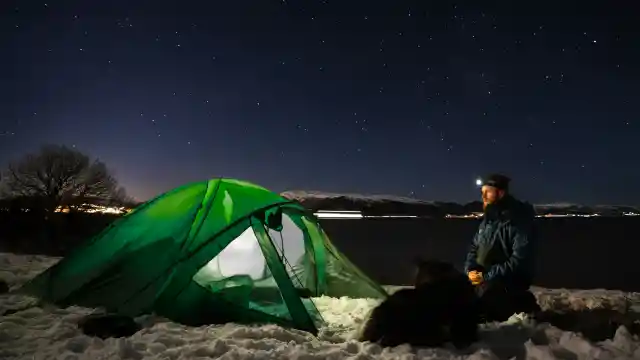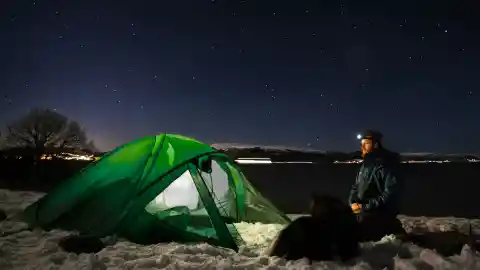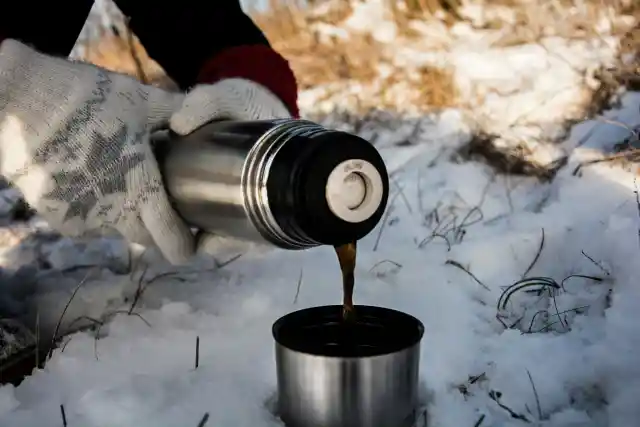Camping doesn't have to end for the season just because the weather becomes colder.


You can camp happily in the cold if you have the appropriate equipment and expertise. Maybe you'll even grow to love it. In the winter, ordinary sights become extraordinary, and even a short backpack excursion might feel like a thrilling adventure in the snow.
For those who are interested in camping in cold weather, here are some fundamental guidelines.
Wear layers
It's a camping custom to bring every blanket, rug, and sleeping bag you can find when the weather turns chilly, but it's not always a good idea to stack that up . The amount of heat lost via the earth should not be underestimated. Your heat is absorbed by the chilly soil at night, thus an effective roll mat is necessary. Furthermore, keep in mind the counterintuitive tip if you've piled on a lot of blankets and you're starting to feel cold: yeah, cover yourself with a blanket on top, but also add some extra layers beneath.
Avoid sweaty layers
Stay dry. Your body temperature will drop fast if your clothing is wet because water transfers heat more effectively than air. Over time, even working up a sweat might dangerously chill you down. Go slowly and remove layers to reduce sweating. Leave the trail runners at home since wet feet lead to freezing feet. Snowshoes, waterproof boots, and gaiters are needed when slogging through deeper snow . You can wear your regular hiking boots with some waterproofing treatment if you plan to go on top of compacted snow.
Cover your head, not your face
In order to retain body heat while you sleep, wear a balaclava, toboggan, or stocking cap over your head. Another strategy to trap heat is to cinch your wrap bag so that just your mouth, nose, and eyes are visible. At night, avoid breathing inside your sleeping bag. Instead, inhale via a bandana or stocking cap. Breath moisture will dampen your sleeping bag and lessen its insulating power.
Sleeping pad
The heat loss from sleeping on the ground is caused by conduction, and without a good, insulated pad below, even a "warm" cold-weather sleeping bag is still chilly. Usually, inflatable sleeping pads that aren't particularly designed for cold weather will underperform below roughly 30 degrees Fahrenheit, so try a closed-cell foam pad (CCF). Just place your self-inflating mattress on top of it.
Stay hydrated and eat


Make certain that your meals are rich in calories when you plan them since your body must burn calories to keep warm. Make basic, one-pot meals wherever possible to keep your cooking time down. You don't want to fiddle with complicated preparations when you're exhausted and starving at a chilly campground. To keep hydrated, which can be more of an issue in the winter than in the summer, make sure you drink lots of water. Don't forget to pack a burner so you can boil hot water. Hot chocolate or any warm beverage can be used to rapidly raise someone's body temperature if they become hypothermic.
Put hot water bottle near your core body part
As opposed to the conventional recommendation, which is to fill a bottle with hot water and position it at your toes, place it near the crotch. This will heat the blood that circulates throughout your body from that central point, reaching all of your limbs and warming your entire body more quickly. It makes a big impact, and you may start teaching the next camper this simple tip right away.
Don't hold your pee
This one seems to be stressed by seasoned winter campers. When nature calls, don't sit around—your body will use up precious calories heating any pee that may be held in your bladder. Instead, stay active and drink lots of water. To avoid having to go outside in the cold at midnight to urinate, keep an additional bottle inside the tent (unmarked at your own risk).
Vent your tent
Even with an open entry, water vapor usually condenses on the inside wall of a tent. Your equipment will become wet as the ice melts. Keep your equipment covered or inside trash bags to prevent frost, and use a tent brush to gather ice crystals into heaps that may be collected before they melt. If the weather permits, don't forget to dry out your equipment every day. When spending a day outside, flip your tent over and allow any excess moisture to be drained by the sun or a strong breeze.
Choose the right tent
For winter camping, pick between a three- or four-season tent. Most moderate winter settings may be managed by a three-season tent, which allows for more ventilation to lessen condensation within the tent. Tents intended for four seasons are made to endure strong winds and a lot of rain or snow. They usually feature a rainfly that reaches nearly to the ground and little ventilation mesh to minimize drafts. In addition, the poles are strong enough to withstand wind. Make sure the tent you select can accommodate an additional person when purchasing one; if two individuals will be sharing the tent, acquire a three-person tent. In this manner, you'll have room to store equipment within the vestibule or tent. to keep it out of the elements.
Wear sunscreen
Even in the dead of winter, never undervalue the might of the sun. At high elevations, the sun's intensity can be greatly intensified, amplified by its reflection off the dazzling white snow. Wintertime excursions sometimes result in sunburns and eye injuries, which can cause permanent harm. Every day, slather your lips, face, and any exposed skin with a high-SPF sunscreen. Wear high-quality sunglasses to protect your peepers; possibly, choose ones with side coverage.